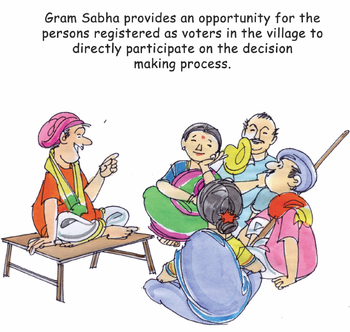Chief Minister
Manohar Parrikar was recently reported to have indicated in the course of
legislative debate that he would rather have a referendum than let Gram Sabhas take a decision on the much contested developmental plans that form part of the
Regional Plan. Subsequently, the Chief Minister has been reported to have
suggested that Gram Sabhas are only advisory in nature, said the Chief
Minister, their decisions cannot be legally binding on the panchayat.
Given that that
the Chief Minister is not alone in his observations, and his opinion is shared
by many developers I would like to first reference, and then engage with, the arguments
presented by similarly inclined commentator in the public sphere.
Speaking in the context of migrants, Prabhakar Timble felt obliged to also suggest that, “…we
notice the Gram Sabhas and Village groups of Goa opposing almost all proposals
of investment or development in the village. To a large extent, the
opposition at the Gram Sabha is from those members who are defeated at the
Panchayat elections. In a multi-cornered contest at Panchayat elections, the
aggregate number of defeated candidates is sizeable in relation to the elected
members of the Panchayat. It is really a funny situation wherein the
elected Panchayat is held hostage by the Gram Sabha under the domineering
influence of the candidates who are rejected by the village electorate and who
later form the active component at the Gram Sabha. I have not heard of Gram
Sabha directing and recommending the Panchayat “to do” specific projects or
encourage a set of economic activities in the village.”
Rather than
address the issue of the legality of the Gram Sabha’s capacity to direct the
Sarpanch and council, I would like to deal with the logic displayed above that
attempts to undermine the validity of the discussions that take place in the Gram
Sabha. Timble’s logic suggests that the candidates who have won the election
are approved by the electorate, and those who have lost the election are
rejected by the same body. In making this suggestion, Timble could not be
further from the truth.
The
“first-past-the post” method that Indian electoral system uses to determine the
winner in an election is but one of several ways of doing so. In this method,
the person with the highest votes wins, even if the number of these votes do
not constitute a majority of the electorate, and it is possible that as a
result of the multi-cornered contests that Timble draws our attention to, the
winner in fact enjoys the confidence of just a minority of the electorate.
Indeed, as has been pointed out, the first-past-the post method is ideally used
in elections between two parties. In such a case, where electoral contests are
contested by beyond three parties, it would be highly illogical to assume that
the winner holds the confidence of the majority and has the right to take
decisions on agendas that will hold significance beyond the five year period
that they are elected for.
In a situation
where the winner of an election may hold the confidence of only a minority of
the electorate, it makes sense to read the result of the elections as securing
the right of the successful candidate to lead deliberations in the panchayat
and Gram Sabha, but definitely not to make unilateral decisions. The
multi-cornered fights in the Gram Sabha are evidence of the complex nature of
the Panchayats and a testament to the vibrancy political life of the
electorate. The Gram Sabha then, is not only a crucial space where the
tensions, and ideas can be debated and then independently voted on, but a
critically important one if we are to ensure that the Panchayat is genuinely
representative of democracy.
Having said
this, there is a need to recognize two valid criticisms that are leveled
against the operation of Gram Sabhas. The first is the criticism that given the
number of persons with strong opinions, these Gram Sabhas often descend into
chaos, where everybody is screaming, no one is listening, and nothing gets
done. The second criticism is that oftentimes decisions can be taken that
violate fundamental principles of law.
The first
criticism is really a testament to the fact that a culture of debate has not
yet taken solid root in our political life. The blame for this lies as much at
the feet of persons outside of power, as those who hold power. Sarpanches
should be required to acquire a training in how to effectively conduct debates
where all sides are allowed space to present and rebut arguments. Where persons
fail to cooperate with the process, the law provides for the presence of police
who can be called to restore order. Unfortunately, when the police are called,
it is usually to intimidate persons with opinions opposite to that of the
Sarpanch who seeks to push his agenda through.
In the second
case, if, and when Gram Sabha decisions have been taken in violation of basic
principles of law, this opens up space for the decisions of the Gram Sabha are
adjudicated by the superior courts that exist both within the panchayat system
as well as outside of it. Rather than see adjudication of these allegedly
faulty decisions as a problem, once more this process should be seen as a way
to build up precedents for Gram Sabhas to follow, and harmonize this system of
local self governance with the larger systems of state and central governance
that have until date received far more importance.
The problem
however seems to be that rather than allow for a more democratic state,
business interests and the interests of the MLAs are working together to deny
this possibility by writing off the Gram Sabhas as failures even before these
institutions have been allowed to work in an ideal environment.
(A version of this post was first published in the Gomantak Times 18 April 2013)


No comments:
Post a Comment